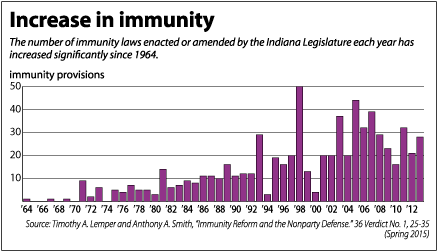Subscriber Benefit
As a subscriber you can listen to articles at work, in the car, or while you work out. Subscribe NowAs a plaintiffs’ attorney, Frank Julian has often encountered the state’s immunity laws in his practice. But when he led a study to review the number of protective provisions in Indiana Code, he could not believe the final tally.
“I was actually shocked at how many immunity laws there were,” Julian said.
Julian, who practices at Sweeney Julian P.C. in South Bend, led the study of the Indiana Code as chair of the Indiana Trial Lawyers Association’s Task Force on Immunity. The task force was convened in response to the annual fight the association wages in the Statehouse against new immunity laws.
Members of the task force were Joe Williams of Price Waicukauski & Riley LLC; Tara Worthley of Langer & Langer; and Nick Baker and Sam Krahulik, both of the Hastings Law Firm.
After the group finished the review, it presented the findings to the 2014 Interim Study Committee on Courts and the Judiciary in October. Julian estimated Indiana has at least 273 immunity laws.
A study by two Indiana University scholars underscored the conclusions of the ITLA Task Force. Timothy Lemper of the IU Kelley School of Business in Bloomington and Anthony Smith of the IU Judd Leighton School of Business and Economics in South Bend did research as part of the Indiana General Assembly’s 2014 study of the use of a nonparty defense in cases involving immune nonparties.
The professors found that in the past two decades Indiana has dramatically added immunity laws while other states have been limiting such protections. They traced the beginning of Indiana’s growth in immunity statutes to the Legislature’s overhaul of the state’s tort law in 1998.
Offering immunity protections seem to be a good idea at first, Julian said. However, he argued these laws are trouble because they tend to deny Hoosiers the right to go to court, which has been granted by both the U.S. and Indiana constitutions.
“The immunity essentially strips whole classes of citizens in Indiana of their right to a jury trial,” Julian said. “They have no right to be heard.”
In addition, he continued, these protections shift the costs to the taxpayers. If a company or individual cannot be held responsible, many times the injured party ends up becoming medically disabled and needs public assistance.
According to the IU professors’ research, Indiana has immunity laws covering such parties as landowners who allow the gleaning of produce from their property, owners of ammonia products that have been stolen, mental health service providers who deal with violent patients, event sponsors and advertisers, and owners of firearms or ammunition used by others.
The pair argued the primary result from the immunity laws is that negligent people are being protected from meritorious lawsuits.
Like Julian, task force member Williams has also butted up against immunity claims in court. He agreed with Julian that the Legislature’s continued passage of immunity laws is chipping away at the citizens’ fundamental right to take their grievances to a jury.
 “I think ‘shocked’ is really the right word,” Williams said of the number of immunity laws. “I can assure you if people really dug into the (Indiana) Code and saw the number of special interests and industries provided immunity, they would be shocked.”
“I think ‘shocked’ is really the right word,” Williams said of the number of immunity laws. “I can assure you if people really dug into the (Indiana) Code and saw the number of special interests and industries provided immunity, they would be shocked.”
Testifying before the interim committee, Julian argued against “corporate amnesty” and giving “a blank check to negligent people to hurt Hoosiers.”
How much of an impact the ITLA Task Force had is difficult to determine, both Julian and Williams said. They believe the legislators did listen and, perhaps, got a better understanding of the issue.
The interim committee decided against taking any action on immunity laws. During the 2015 session of the Indiana General Assembly, four bills extending immunity were introduced and all but one was signed into law.•
Please enable JavaScript to view this content.
